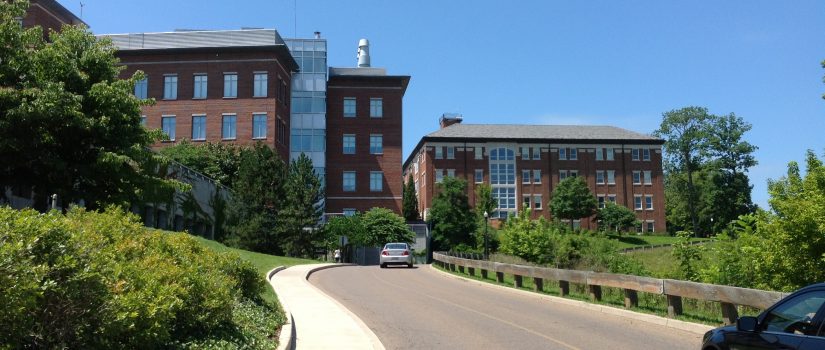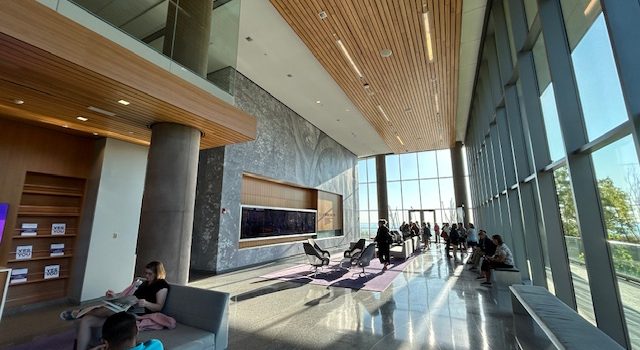Getting To Know Denison University–Again
Cold weather and the Omicron variant have forced me back to virtual reviews for a little while. So, I contacted schools that I had visited before to ask if I could write an update. I’m very happy that Denison University was the first school to say yes. I took a couple of virtual tours and listened to a virtual information session along with several other YouTubes to refresh my memory of this school. In addition to a Zoom interview, I updated my Denison Pinterest page for you. There’s a lot to unpack in this post, so read on!
Drew Riley, Director of Admissions, and I chatted about Denison University. Please listen now!
One of the original Colleges That Change Lives, Denison University is a liberal arts college with 2,200 undergrads. Only a fifth of the student body comes from Ohio.Nearly a fifth comes from outside the US. Denison University also ranks among US News’ Top 50 National Liberal Arts colleges for this admissions cycle. While rankings and inclusion in three editions of a well-circulated book are not the best reasons for choosing a college, there is much to like about Denison University. This school also has some interesting traditions, including Denison Day, aka ‘D-Day’ which has brought performers such as Diana Ross and the Supremes, The Who, Dave Matthews and Mos Def to campus.
Denison’s statistical profile and gen-ed requirements are most similar to five other schools that I have visited.
These schools include Dickinson College (PA), Gettysburg College (PA), Franklin and Marshall College (PA), Muhlenberg College (PA) and Hobart and William Smith College (NY). Interestingly, Denison’s endowment of approximately $900 million is by far the largest among these six selective liberal arts colleges. Their retention and graduation rates are about the same. Denison retained 89 percent of the freshmen who entered in 2020. The most recent four-year graduation rate I could find was 77 percent, an excellent performance for any college.
In addition, among these schools, Denison has the largest campus and is also closest to a major city. Columbus is the second most populous city in the Midwest after Chicago as well as a state capital and major business center. However, you must have access to a car to go there often. Lastly, in my opinion, Granville has a nicer small town feel than the communities that host these other schools. While every comparable and more selective school has its strengths, Denison has more locational strengths than most private liberal arts colleges in New England, New York or Pennsylvania.
Denison also has a few majors and minors that you’re not likely to find at other liberal arts colleges.
You can study Bluegrass Music, Data Analytics, Global Commerce, Global Health, Journalism and Music Composition, as well as concentrations in Financial Economics and Computational Science. This is also one of the best small colleges to study performing arts and film through the recent opening of the Eisner Center as well as the Cinema House that has been part of campus life for nearly 60 years.
Denison University is not the ‘safe school’ for your college lists.
Less than 30 percent of applicants for the Class of 2024 were accepted. Forty-five percent were accepted through Early Decision. Those students made up just over 40 percent of the freshmen who arrived in the fall. Denison’s acceptance rate was lower than any of the most comparable schools. The rates for those schools: Dickinson (52%), Gettysburg (48%), Franklin & Marshall (37%), Muhlenberg (62%) and Hobart and William Smith (62%). If you are rank conscious, Denison was actually more selective than Kenyon College (OH) which ranks higher (28th vs. 44th) in US News’ latest college guide.
Denison University has been test optional for a while.
Test scores are only Considered if you decide to submit them. Among those who submitted scores, the middle 50 percent who took the SAT scored between 1220 and 1430. The middle 50 percent for the ACT Composite was between 28 and 32. Among the most comparable schools, only Franklin & Marshall and Gettysburg, also test optional, consider the scores to be Important, if submitted. The statistical profile of a Denison freshmen class vs. Kenyon’s freshman class are more similar than different. However, Kenyon will consider your test scores to be Important if you submit them, according to their latest Common Data Set.
Denison advertises that they will meet 100 percent of demonstrated need.
Given the endowment I would believe this. However, the average borrower who graduated in 2020 owed over $32,000 in student loans. The average need-based award for the Class of 2024 was just over $42,000, well over half of the estimated total cost of attendance, even for the following year. The average merit award was about $20,500. Denison may work out to be less expensive than Home State U or Neighboring State U for the neediest students. However, if you like Denison, and are cost conscious, take a look at Kenyon, too. Kenyon is a little further from Columbus and its endowment is less than half that of Denison’s. But the college has fewer students–and the 2020 graduates who borrowed owed, on average, about $10,000 less.
Denison’s endowment in FY 2020 was within $50 million of Colgate University, which has over 1,000 more students. However, Colgate has recently gone to no-loan financial aid policies for families earning $150,000 or less. I can only wish that Denison would consider such policies, though they are quite rare in college financial aid circles. Denison’s endowment is about the same as Davidson College (NC), an aspirational school that has about 2,000 undergrads. Davidson students who graduated in 2020 who had to borrowed owed just under $23,000. I want to believe that Denison could help its students keep their average debt to under $27,000, the maximum they could borrow over four years through the Federal Student Loan Program.
Denison has a very attractive 1,000 acre campus.
The campus was designed in 1916 by the the famed landscape architectural firm of Frederick Law Olmsted Sons, whose founder was the designer of New York City’s Central Park, some of the great Chicago lakefront parks, and distinguished college campuses such as Stanford and Wellesley. Views from the Hill are breathtaking. While some time has elapsed between in-person and virtual visits, this is one of the nicest college campus settings I have seen anywhere.
The original campus layout has guided the more recent development of the school, including new housing and recreational facilities as well as a 550-acre biological reserve. Academic halls rise from center of the College Hill, flanked by residence halls to the east and west, arranging buildings in quadrangles, sometimes leaving one side open to take advantage of the views across the hills and valleys north and south. Swasey Chapel, the signature building, seats nearly 1,000 people for campus events.
Granville, like the campus, is very attractive and clean.
If a filmmaker wanted to make a love story around a small college and college town Granville would be the perfect place and many people would probably jump at the chance to be extras. However, little of the retail mix aside from coffee and dessert shops–though Whit’s Frozen Custard is legend–is targeted towards college students. A very small town, Granville is close enough to be considered a suburb of Columbus. However, the journey along Ohio’s State Highway 161 between campus and Interstates 71 or 670 made my trip feel longer than 35 to 40 minutes when I was there. Newark, much closer to campus, offers accessible big-box stores and chain restaurants, provided you have access to a car.
Virtually every Denison student lives on campus.
All first-year students share double rooms in traditional corridor-style residence halls. After sophomore year Denison offers impressive choices for a small school. Juniors may live in single rooms in the traditional halls,suites that share a common lounge and bathroom, the Stone Apartments or the Homestead, a student-run alternative living community with a focus on ecological sustainability. Seniors may select these options as well as substance-free Satellite Houses or co-ed apartments where male and female students have the option of living in the same unit. Theme housing, including Modern Languages and Honors, is also offered.
Greek social life is popular at Denison, attracting over a quarter of the men and nearly 40 percent of the women. However, these organizations do not have their own residences. The university has also dealt with unrecognized Greek social organizations that are also national fraternities. Athletics are also important at Denison. The Big Red compete in 26 NCAA D-3 varsity sports. According to the university’s Web site, Denison has captured a conference record 17 All-Sports trophies in the North Coast Athletics Conference in addition to 151 total conference championships.
Denison has some geographic diversity within the alumni base.
The university has nearly 2,700 alumni based in the Columbus metro area, which is no surprise, given the economic growth there. However, there also over 2,100 alumni in the New York City metro area, nearly 1,800 based in and around Chicago and nearly 1,200 based in and around Boston. Noted Denison alumni include actors Hal Holbrook, Steve Carrell and Jennifer Gardner, former U.S. Senator and Indianapolis mayor Richard Lugar, Indianapolis 500 winner and car owner Bobby Rahal, legendary Ohio State football coach Woody Hayes and Michael Eisner, former CEO of The Walt Disney Company.
Conclusions
Parents should be able to trust Denison University to keep their children educated, happy and safe during their four years in Granville and on the Hill. I also like the proximity to Columbus for employment, enrichment and entertainment versus the opportunities near the most comparable schools. From my personal, then later my virtual visits, the culture appeared to be similar to the most comparable schools as well as Colgate and Hamilton, which I visited this past fall.
But Denison is also in an odd quandary. It’s not quite as selective as colleges such as Colgate or Hamilton. But it’s also not far behind when it comes to resources from the endowment. If Denison could help to lower its average student indebtedness, its acceptance rate would probably go down. But the newest and grateful alumni and their parents would be more supportive of their alma mater.
Listen to my conversation about Denison with Drew Riley now!
Need help on the journey to college? Contact me at stuart@educatedquest.com or call me at 609-406-0062.
Want to know more about me? Check out these podcasts!
Listen to my talk, College Is A Learning AND Living Community, hosted by Dr. Cynthia Colon from Destination YOUniversity on Voice of America Radio!
Listen to my talk, What Exactly Is a Good College? hosted by test-prep experts Amy Seeley and Mike Bergin on Tests And The Rest!




